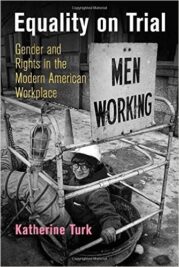
By Katherine Turk. Synthesizing the histories of work, social movements, and civil rights in the postwar US, examines how Title VII of the Civil Rights Act, which outlawed workplace discrimination on the basis of such personal attributes as sex, race, and religion, inspired a generation of Americans to dispatch expansive notions of sex equality but also how the law’s ambiguity also allowed for narrow conceptions of sex equality to take hold for conservatives allowing businesses to comply with the law without transforming basic workplace structures or ceding power to workers. Read more.
